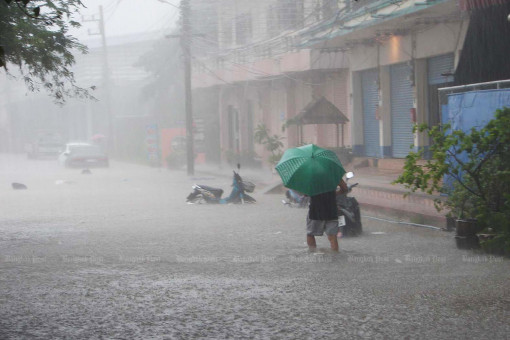Farmers urged to utilise rainwater
PUBLISHED : 25 Jul 2023 at 04:00

The Royal Irrigation Department (RID) has come up with a plan to protect the nation’s water reserves in anticipation of a long dry spell brought on by the El Niño weather phenomenon.
RID director-general Praphit Chanma said the plan, which will be carried out under the supervision of the Office of National Water Resources (ONWR), will see a public awareness campaign launched to raise awareness among the public about the importance of saving water resources.
El Nino is causing less rain to fall in the region, raising fears of a severe drought when the monsoon ends in November. Experts fear this year’s El Nino could have an impact on the region’s average rainfall well into 2025, Mr Praphit said.
According to a report by RID’s Smart Water Operation Centre (SWOC) released on July 14, if the current rainfall trend continues, then by the end of the rainy season on Nov 1, the nation’s 35 major reservoirs would only contain 44.166 billion cubic metres of water — about 62% of their total capacity.
As of this week, the four major reservoirs along the Chao Phraya River Basin, namely Bhumibol Dam in Tak, Sirikit Dam in Uttaradit, Kwai Noi Bamrung Daen Dam in Phitsanulok, and Pasak Jolasid Dam in Lop Buri, contain 14.194 billion m³ of water, or about 57% of their total capacity, he said.
More assessment is needed ahead of the end of the rainy season, so the RID has ordered all sectors to improve their overall water resource management, he said.
The RID is urging farmers to increase their utilisation of rainwater runoff to irrigate their plots ahead of the planting season to ensure there is enough water to irrigate their plots when the dry season begins.
When asked to comment on the possibility of crop failures due to the dry conditions, Mr Praphit said the RID would assist farms which are affected by a prolonged drought, especially those that grow perennial plants like durian and rubber, which are more expensive to cultivate.
The RID will ask the local administrative office and the Joint Management Committee (JMC) to pump water from the four major dams to drought-hit areas, and expedite the construction of water management projects, said Mr Praphit.

